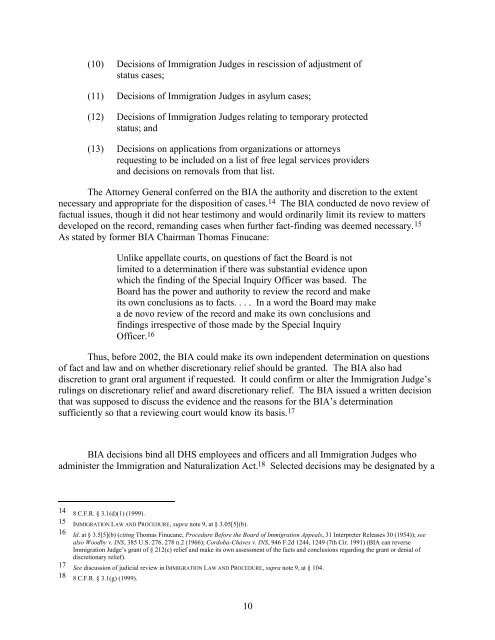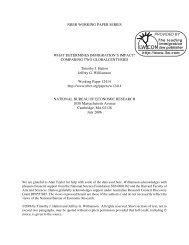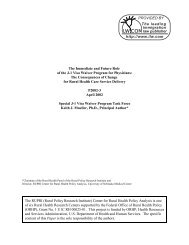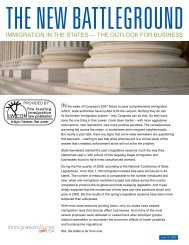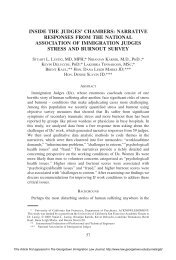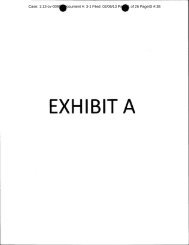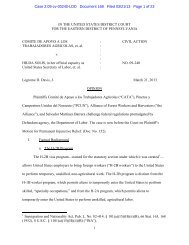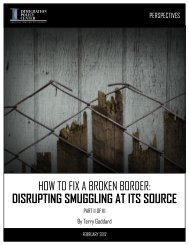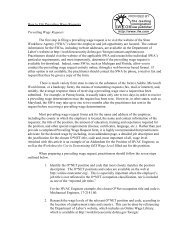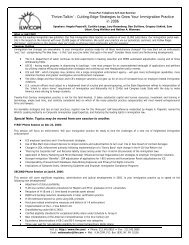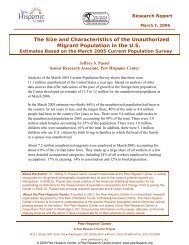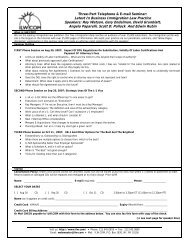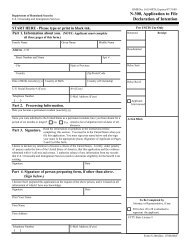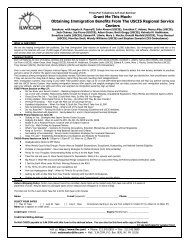Study of Board of Immigration Appeals Procedural Reforms - ILW.com
Study of Board of Immigration Appeals Procedural Reforms - ILW.com
Study of Board of Immigration Appeals Procedural Reforms - ILW.com
You also want an ePaper? Increase the reach of your titles
YUMPU automatically turns print PDFs into web optimized ePapers that Google loves.
(10) Decisions <strong>of</strong> <strong>Immigration</strong> Judges in rescission <strong>of</strong> adjustment <strong>of</strong><br />
status cases;<br />
(11) Decisions <strong>of</strong> <strong>Immigration</strong> Judges in asylum cases;<br />
(12) Decisions <strong>of</strong> <strong>Immigration</strong> Judges relating to temporary protected<br />
status; and<br />
(13) Decisions on applications from organizations or attorneys<br />
requesting to be included on a list <strong>of</strong> free legal services providers<br />
and decisions on removals from that list.<br />
The Attorney General conferred on the BIA the authority and discretion to the extent<br />
necessary and appropriate for the disposition <strong>of</strong> cases. 14 The BIA conducted de novo review <strong>of</strong><br />
factual issues, though it did not hear testimony and would ordinarily limit its review to matters<br />
developed on the record, remanding cases when further fact-finding was deemed necessary. 15<br />
As stated by former BIA Chairman Thomas Finucane:<br />
Unlike appellate courts, on questions <strong>of</strong> fact the <strong>Board</strong> is not<br />
limited to a determination if there was substantial evidence upon<br />
which the finding <strong>of</strong> the Special Inquiry Officer was based. The<br />
<strong>Board</strong> has the power and authority to review the record and make<br />
its own conclusions as to facts. . . . In a word the <strong>Board</strong> may make<br />
a de novo review <strong>of</strong> the record and make its own conclusions and<br />
findings irrespective <strong>of</strong> those made by the Special Inquiry<br />
Officer. 16<br />
Thus, before 2002, the BIA could make its own independent determination on questions<br />
<strong>of</strong> fact and law and on whether discretionary relief should be granted. The BIA also had<br />
discretion to grant oral argument if requested. It could confirm or alter the <strong>Immigration</strong> Judge’s<br />
rulings on discretionary relief and award discretionary relief. The BIA issued a written decision<br />
that was supposed to discuss the evidence and the reasons for the BIA’s determination<br />
sufficiently so that a reviewing court would know its basis. 17<br />
BIA decisions bind all DHS employees and <strong>of</strong>ficers and all <strong>Immigration</strong> Judges who<br />
administer the <strong>Immigration</strong> and Naturalization Act. 18 Selected decisions may be designated by a<br />
14 8 C.F.R. § 3.1(d)(1) (1999).<br />
15<br />
IMMIGRATION LAW AND PROCEDURE, supra note 9, at § 3.05[5](b).<br />
16 Id. at § 3.5[5](b) (citing Thomas Finucane, Procedure Before the <strong>Board</strong> <strong>of</strong> <strong>Immigration</strong> <strong>Appeals</strong>, 31 Interpreter Releases 30 (1954)); see<br />
also Woodby v. INS, 385 U.S. 276, 278 n.2 (1966); Cordoba-Chaves v. INS, 946 F.2d 1244, 1249 (7th Cir. 1991) (BIA can reverse<br />
<strong>Immigration</strong> Judge’s grant <strong>of</strong> § 212(c) relief and make its own assessment <strong>of</strong> the facts and conclusions regarding the grant or denial <strong>of</strong><br />
discretionary relief).<br />
17 See discussion <strong>of</strong> judicial review in IMMIGRATION LAW AND PROCEDURE, supra note 9, at § 104.<br />
18 8 C.F.R. § 3.1(g) (1999).<br />
10


